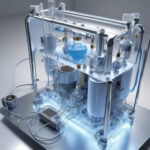In recent years, the integration of artificial intelligence (AI) in healthcare has gained momentum, particularly in managing complex conditions like dementia. A Cambridge-based startup has developed a pioneering AI-supported device called the SenS2 hub. This innovative technology aims to enhance the care of individuals suffering from dementia while preserving their independence and dignity.
The SenS2 hub operates by monitoring the activities of its users in a non-intrusive way, allowing caregivers and family members to keep track of their loved ones’ daily activities and home conditions. The device is designed to foster a sense of security for both patients and their families without compromising the autonomy of the individual. The ability of the SenS2 hub to function discreetly makes it a promising tool for dementia care.
Statistics reveal that around 50 million people worldwide are living with dementia, a figure that is projected to triple by 2050 according to the Alzheimer’s Association. With the increase in elderly populations, the need for effective and compassionate care solutions becomes ever more critical. This is where tools like the SenS2 hub play a crucial role.
The SenS2 hub has been designed to recognize patterns of behavior over time. It collects data on various activities including eating, movement around the home, and even social interactions. This information is then analyzed by AI algorithms to identify any deviations from normal behavior. For instance, if the system detects that an individual hasn’t moved from their chair for an unusually long time, it can alert caregivers or family members to check in. Such early interventions can potentially prevent accidents or callbacks to hospitals.
Case studies emphasize the effectiveness of the SenS2 hub. In pilot programs, families reported a significant reduction in their anxiety levels, knowing they could monitor their loved ones without intruding on their personal space. One caregiver noted, “The hub has changed the way we care for my father. We feel connected, yet he retains his freedom. It has done wonders for his quality of life.”
Moreover, the device offers insights that can inform health professionals about the state of a patient’s well-being. Data generated by the hub can be shared with doctors, contributing to more informed healthcare decisions. This not only increases the quality of care but also streamlines communication between family caregivers and health professionals.
Importantly, the SenS2 hub is designed with privacy in mind. Data collected is encrypted and shared only with those who have been authorized by the user. This commitment to privacy helps ease apprehensions that some may have about such monitoring technologies. Considering that many individuals living with dementia value their independence, the SenS2 hub provides a solution that respects and enhances that independence while ensuring safety.
The technology is receiving praise not just from families and caregivers, but also from experts in the healthcare field. Dr. Sarah Thompson, a leading researcher in geriatrics, highlighted the importance of technology in dementia care, stating, “Innovative solutions like the SenS2 hub can play a vital role in enhancing the quality of life for those with dementia. We need to embrace these advancements that offer practical assistance while respecting patients’ rights.”
This initiative is part of a broader shift towards technology in healthcare designed to improve patient outcomes and streamline caregiving processes. Trials and research around similar AI technologies are ongoing, focusing on their applications in various mental health conditions beyond dementia.
As healthcare continues to evolve, the integration of sophisticated technology, such as the SenS2 hub, symbolizes hope for families grappling with the complexities of dementia care. Not only does it offer a practical solution for maintaining safety, but it also nurtures the dignity and independence that every individual deserves.
In conclusion, the rising capabilities of AI in monitoring health conditions signify a promising avenue for transforming dementia care. Moving forward, augmenting traditional caregiving methods with smart technology will likely pave the way for innovative solutions aimed at enhancing the quality of life for individuals with dementia and their families.












